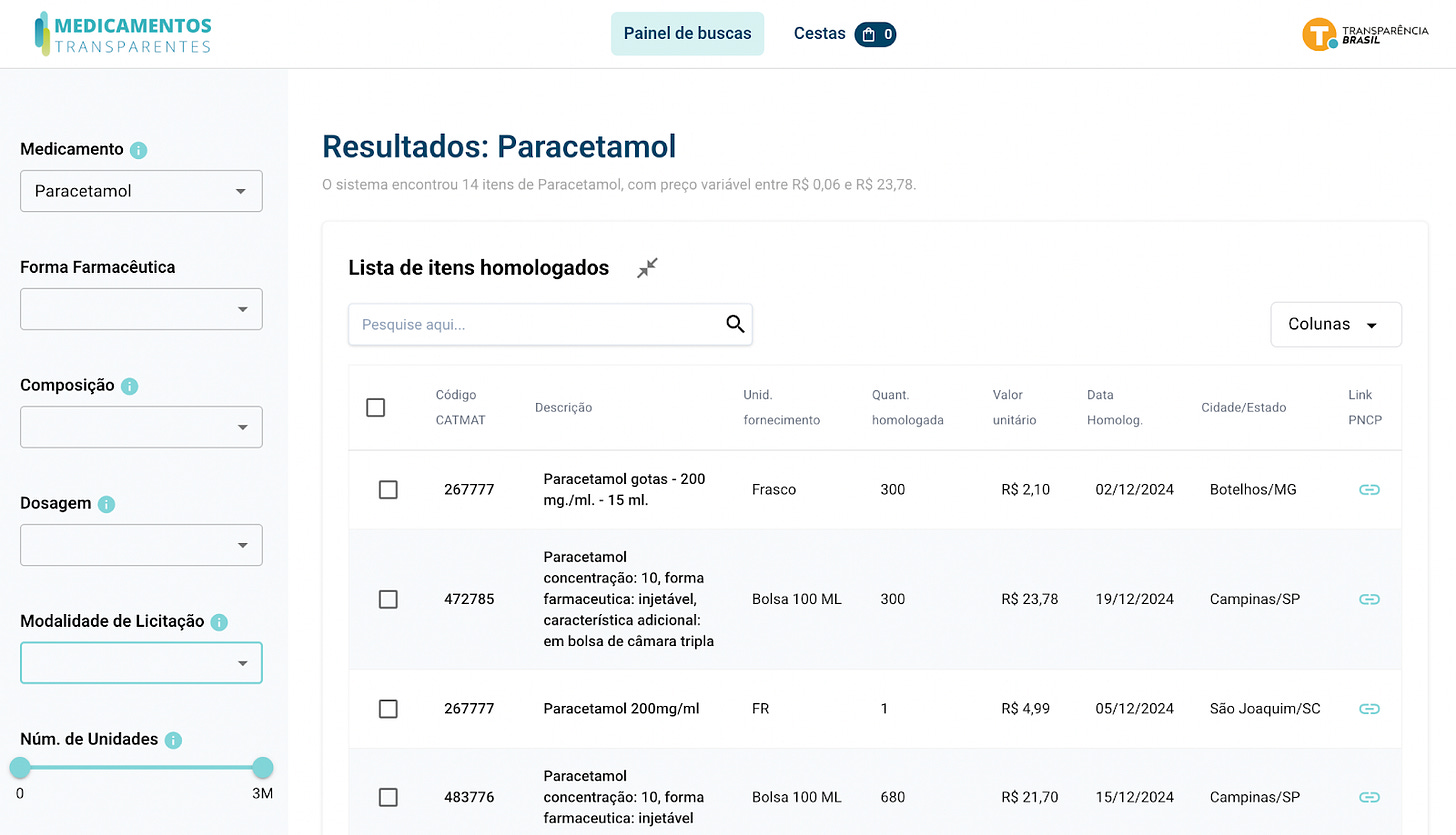Contracts, Data and Investigations - Edition 81
This month: US influencers, a medicine price tracker in Brazil, surveillance tech contracts, and handy open data tools.
Welcome back to our newsletter, covering stories about the use and abuse of public contracts and providing tips and insights on how to investigate public procurement. Are you investigating a public contract right now? Get in touch – we’d love to help.
[What we’re keeping an eye on]
Undocumented influencers: In the United States, POGO’s Nick Schwellenbach investigates political ties and past controversies of the Immigration and Customs Enforcement’s (ICE) top contractor for deportation flights. Over 20 years, the company CSI Aviation received at least $1.6 billion in federal funding.
ProPublica’s Christopher Bing and Avi Asher-Schapiro examine a planned contract for a government expense card program that shows all the classic red flags: a short timeframe for submissions, prior engagement with a potential contractor, and a vendor with little to no track record in government contracting.
With more than 75 executive orders signed during the first months of the second Trump administration, journalists around the world are finding it hard to follow all that’s changing. This GIJN tip sheet may help you keep track.Kyrgyzstan’s new football stadium is being built by a company with ties to the presidency, according to an OCCRP investigation, adding evidence to previous reporting on conflicts of interest in the Central Asian nation’s major contracts.
In better news, the BBC reports that four men have been convicted of corruption after a decade-long investigation into lucrative health contracts in Scotland. Even if it takes a while, there can be consequences for wrongdoing.
[Data insights]
In Germany, basic information about consulting contracts awarded by the federal government is often missing from the Ministry of Finance’s internal reporting, an investigation by the German non-profit FragdenStaat reveals. For example, between 2017 and 2023, on average only two out of three consulting oversight reports included the name of the contracted company, with the most recent one from 2023 missing the name for about 20% of projects. One in three contracts were handed out without public bidding. FragdenStaat has released the reports publicly for the first time in their original form and in a database.
Transparência Brasil has launched Medicamentos Transparentes, a new platform to research and compare medicine prices in Brazil. The platform brings together thousands of data points on public medicine purchases available on the National Public Procurement Portal (PNCP).
“With better data, we can support public management, strengthen control, and empower patients to ensure access to essential treatments,” said Oscar Hernández, OCP’s Director for Latin America at the launch of the project supported through our Lift impact accelerator.
Research by North Macedonia’s Center for Civic Communications into government spending on cars shows that state institutions spent €8.5 million over two years on vehicle leases and purchases at an average cost of €31,760. The most popular brand was Škoda, accounting for every third vehicle. Not surprisingly, the contracts with the highest total value were with Porsche Leasing. In 70% of cases, there was only one bidder per tender. The full research and database of the contracts can be accessed here.
[Tips from practitioners]
Aleksa Tešić covers technology and the misuse of personal data for the Balkan Investigative Reporting Network (BIRN). In an article for IJNet, he offers several tips for journalists who are investigating potential surveillance technology contracts:
Public procurement portals can be a goldmine for discovering purchases for invasive technology — devices like IMSI catchers, cameras and GPS trackers, as well as facial recognition and automated profiling software.
Finding the contracts for this technology and the related technical specifications might not be easy. You can start by using classification codes like CPV (such as 35120000, 32330000, 72200000, 79710000) or UNSPSC as an initial filter. While not perfect, the codes related to surveillance, security systems, video equipment, or even software services can help you prioritize.
The keyword search function of procurement portals usually only covers tender titles, which rarely mention the name of a specific software or product. More juicy details can be found in supporting documents like technical specifications, annexes and price breakdowns – do a full-text search across all documentation if the portal allows it. Look for synonyms too: the term “drone” is rarely used – instead, tenders referred to “unmanned aerial vehicles” or “quadcopters.”
Familiarize yourself with a contracting authority’s typical behavior and identify patterns in their purchases. An institution's mandate, leadership background (especially ties to intelligence or security industries), and handling of sensitive data can all signal its potential to acquire surveillance tech, even under seemingly innocuous contracts.
Follow the vendors. Do some basic due diligence and know that many of these companies maintain little to no online presence.
Check out the article for all the details and some of the most insightful investigations such as an illegal surveillance unit embedded within Serbia’s main energy provider.
[Data tools & resources]
Opentender.eu allows you to search and analyze past tender data from 35 countries in Europe, including 28 EU Member States, the EU institutions, Georgia, Iceland, North Macedonia, Norway, Serbia and Switzerland. The latest updates increase coverage and improves indicators.
This article by Katherine Pennacchio for IJNet profiles NINA, a Latin American platform that provides access to open databases on contracts (using the Open Contracting Data Standard where possible), companies and sanctions from 21 countries. The tool is developed by CLIP and allows journalists to cross-reference key information to reveal alleged corruption networks and other potential irregularities.
Open Knowledge’s Open Data Editor is a free app for people without coding skills to check errors in tables. It comes with an online course full of tips on how to make your datasets better. A new light version of the app is designed especially for low resource settings.
This newsletter has been put together by the Open Contracting Partnership. Thanks for reading. Do give us a like if you’ve enjoyed the read. Did a friend forward you this email?



